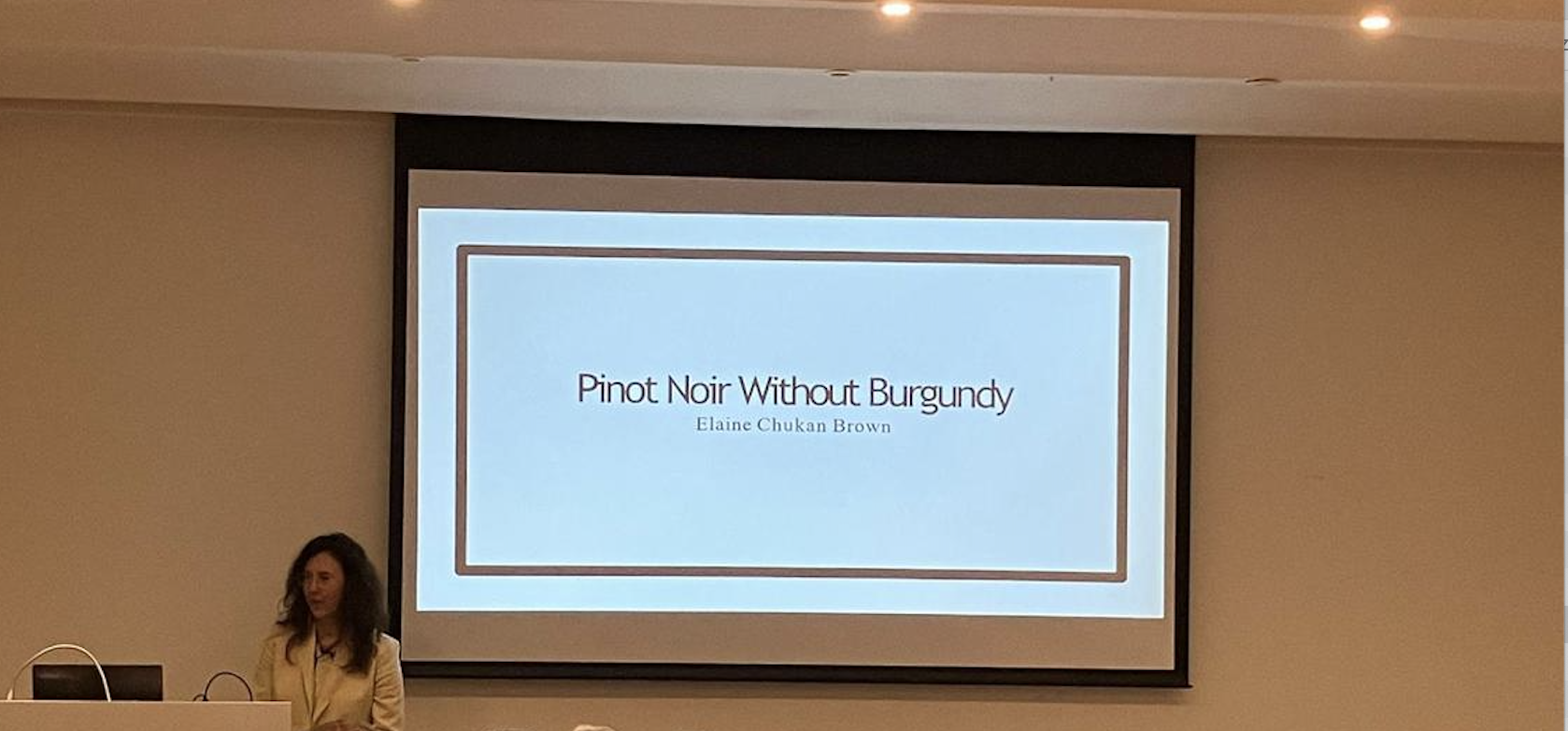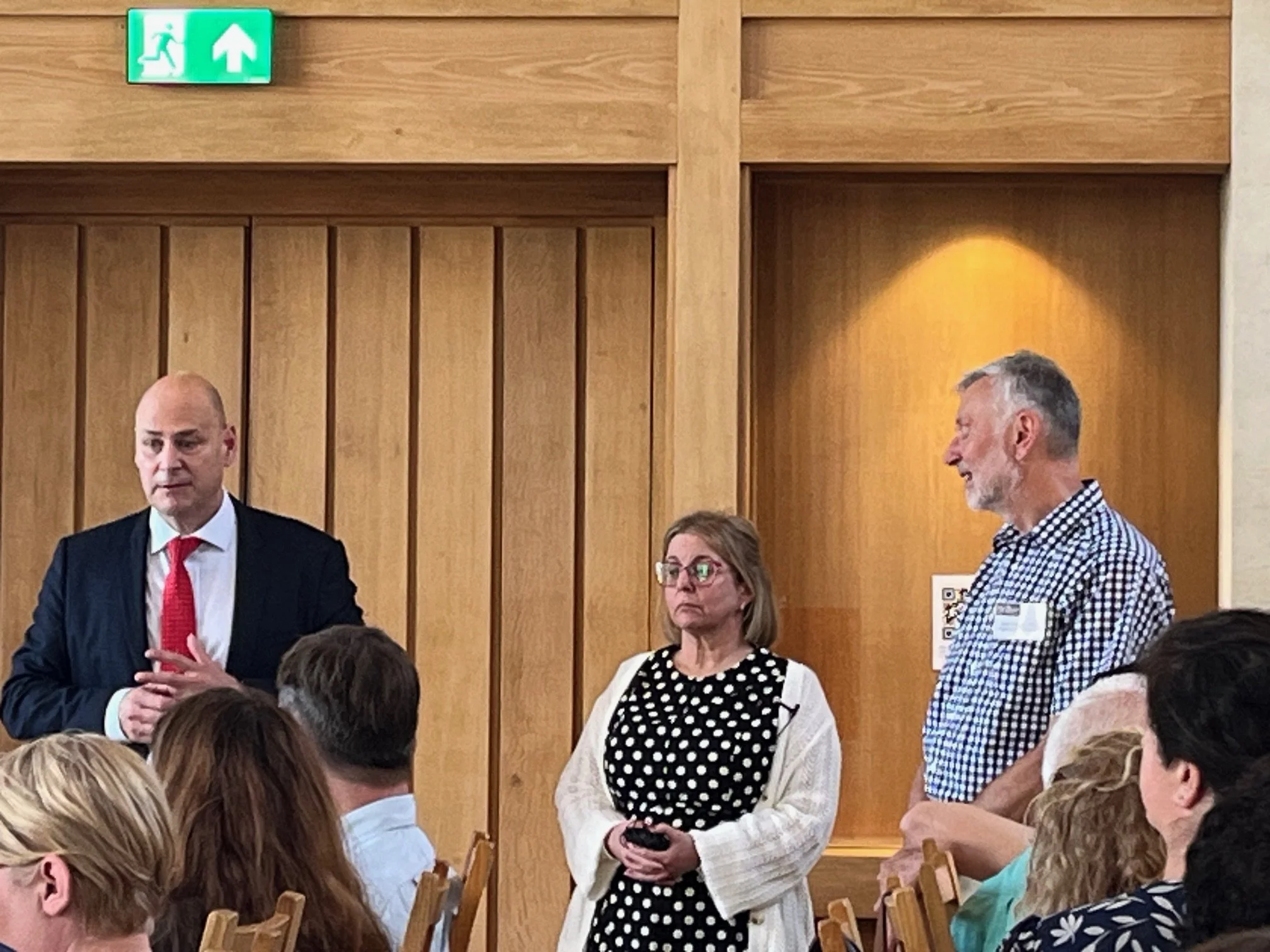Report on the Oxford Symposium on Pinot Noir and Identity
What happens when a hundred people gather together in an Oxford college to talk about Pinot Noir and Identity? Perhaps everyone was asking themselves the same question as they arrived at the inaugural symposium of The Pinot Noir Project on the 10th of July 2025.
Never before had such a diverse group of researchers and wine industry representatives focused their attention on a single grape variety. Everybody came along with something to say – a paper, a panel presentation, or even a poem to share – but nobody quite knew what to expect nor whether we could maintain the momentum over three unseasonably warm days…
Steering Committee members Marion Demossier, Jennifer Smith Maguire and Jacqueline Dutton at Hundred Hills Winery
Steering Committee members Steve Charters MW leading the way to the tasting room with Peter Howland bringing up the rear
Following a visit and tasting of vintage and current release sparkling Blanc de Noirs at Stephen and Fiona Duckett’s Hundred Hills winery in Stonor Valley, Oxfordshire, Day One began with a “warm” welcome from Jacqueline (Jackie) Dutton, Founding Director of the Pinot Noir Project and Professor of French Studies at the University of Melbourne. She suggested that “better understanding of Pinot Noir will help us develop deeper insight into wine as a social, cultural, political, economic, agroecological marker for how to live well with each other in the world today”.
Jacqueline Dutton welcoming symposiasts and opening the event
Foregrounding the importance of “First Peoples First”, acknowledging the Indigenous custodians of Australia, New Zealand, Canada, and the Americas, where grape growing and winemaking arrived with settler cultures, Jackie introduced keynote speaker, wine writer and educator Elaine Chukan Brown, Inupiaq and Unangan-Sugpiaq, from what is now Alaska.
Elaine Chukan Brown - Keynote Speaker Day One
Elaine’s powerful presentation on “Pinot Noir without Burgundy” drew parallels between France’s architectural impositions in Vietnam, including the Hanoi Opera House inspired by Paris’s Palais Garnier, and Burgundy’s vitivinicultural influences in Pinot Noir focused wine regions around the world. Elaine contended that though the French sources are indisputably glorious and worthy of emulation, imitation is an uncritical and ultimately unrewarding response.
Hanoi Opera House, Vietnam and Palais Garnier, Paris, France
Followed by more prompts and provocations from the Pinot Noir Project’s steering committee – Olivier Jacquet, Marion Demossier, Jennifer Smith Maguire and Jackie Dutton, the audience became aware that the Pinot Noir and Identity theme was inherently political and intended to challenge thinking about Pinot Noir, privileging the perspective of the plants, the people and the places where it is grown. Steve Charters MW exposed how wine drinkers have responded in interviews about Pinot Noir and Identity, demonstrating clear tendencies towards interpreting the grape and wine as complicated, aspirational, and needing a narrative.
The morning concluded with a round table discussion on Pinot Noir Markets and Marketing led by Mark de Vere MW eliciting a range of views – academic, global business analysis, and experiential – from Pauline Vicard (Areni Global), Lara Agnoli (Burgundy School of Business) and Mark Savage MW.
During a delicious lunch in the sunny courtyard, everyone discussed which parallel sessions to attend, deciding between three streams, each chaired by a member of the steering committee: 1 - creating identities – humanities and social sciences, 2 - producing identities – viticulture, economics and wine styles, and 3 - consuming identities – business and marketing. Symposiasts complained that there were too many enticing titles to choose between, though they agreed that was better than not enough, and the chairs of each stream tried hard to summarise the main threads of their sessions in a final wrap-up at the end of the day.
A very animated discussion on Pinot Noir’s Sensory Identities, hosted by Elaine Chukan Brown, rounded out the day, including Jordi Ballester (Sensory Analyst, University of Burgundy), Qian Janice Wang (Experimental Psychologist and Food Chemist, University of Copenhagen) and Pascaline Lepeltier (MS and Meilleur Ouvrier de France). Learning how Pinot Noir is positioned in tasting experiences and priced on wine lists and why was truly an eye-opening experience.
Elaine Chukan Brown chairing the Sensory Identities panel with Jordi Ballester, Qian Janice Wang MW, and Pascaline Lepeltier
Pascaline also talked us through the wines that accompanied our Grand Wine Dinner in St Cross Dining Hall that evening, with a few words from the makers and suppliers who had graciously donated their wines.
Grand Wine Dinner in St Cross Dining Hall
Day Two was launched by globally acclaimed expert on Pinot Noir, Jasper Morris MW, in a keynote entitled “Pinot Noir Inside Burgundy – and Beyond” that responded in many ways to Elaine’s initial provocation. After staking his claim at the Oxford podium as an alumnus and descendant of Ethelred the Unready, Jasper recounted his extraordinary experiences as a Pinot Noir specialist, based in Burgundy for around 40 years, in his humorous and engagingly erudite way. Likening his Pinot perspective to a tale of two t-shirts – the first being Nigel Greening’s t-shirt with “Uncertainty” written in Japanese, and the second bearing the slogan “Dogma kills Pinot”– Jasper underscored these principles as fundamental to celebrating the diversity of Pinot Noir, now and in the future.
Jasper Morris MW - Keynote Speaker Day Two
Ann Dumont and Junior Vianna MW presented a fascinating and fast-paced Lallemand Pinot Noir Project tasting, showing wines made with the same strain of Lallemand yeast in different sites – Tasmania, New Zealand, Germany and Burgundy – to demonstrate the persistence of diversity across terroirs.
Lallemand Pinot Noir Project Tasting
Junior Vianna MW, Ann Dumont, and Steve Charters MW
The following round table discussion chaired by Marion Demossier brought climate change to the centre of the conversation, even though it was ever-present in our considerations. Alistair Nesbitt (CEO, Vinescapes), Régis Gougeon (Chemist and Oenology specialist, University of Burgundy), and Steve Dorling (Environmental scientist, weather and climate expert) reiterated the message that we have the scientific and practical methods to counter the climate crisis now upon us, but not enough substantive action on the part of wineries or the wine industry to make it a carbon neutral undertaking. The heritage constraints in Burgundy were evoked as a major impediment to climate and sustainability innovation and development.
Régis Gougeon delivering the grim reality on the Climate Change panel hosted by Marion Demossier with Alistair Nesbitt and Steve Dorling
Climate and sustainability remained at the fore throughout the afternoon in one of the parallel streams, while the other stream explored Hungarian, German, British and Breton production and consumption of Pinot Noir.
Our final round table with winemakers Nigel Greening (Felton Road, NZ), Boris Champy (Domaine Boris Champy, Burgundy), and Gavin Carver (Freedom of the Press, UK) was expertly hosted by Pauline Vicard, who encouraged her panel to cristallise their ideas on making Pinot Noir identities: Boris: “there is not ONE Pinot Noir identity – between Champagne and Burgundy, there are already two”; Gavin: “vintages are so different that we make new wines every time”; Nigel: “the grape has an identity, especially Pinot Noir”.
Pauline Vicard with Nigel Greening, Boris Champy and Gavin Carver
Presenting a wrap-up of the second day were Julian Alston and Peter Howland from the steering committee with Julian singing his own composition in fine style and Peter zigzagging through dream sequences and identity politics to bring proceedings to a close.
The steering committee’s lynchpin and master puppeteer for this symposium, Graham Harding, gave the vote of thanks and the main event finished with a Convivium. Each symposiast was invited to bring along a bottle of Pinot Noir from their own region or with some special meaning to them. About 50 bottles were circulating for several hours, poured by the people who’d brought them, until they were almost all gone. Wines ranged from Texan Pinot Noir rosé and red from Reddy Vineyards to Domaine Maurice et Anne-Marie Chapuis Corton-Perrières, Grand Cru 1999, from South African Iona Monopole Kroon Single Vineyard Pinot Noir 2022 to Japanese/New Zealand Kusuda Pinot Noir 2017, and Croatian Kosovec Pinot Noir Selekciya 2011, to name but a few of the wonders on pour. And a good time was had by all.
Dominic Buckwell perusing the Convivium wines
And a good time was had by all.
Day Three comprised a “Pinot Futures” workshop in two parts followed by an agreed proposal for follow-up actions and events. Several key research projects were co-designed in small groups using futures thinking methods. Working groups will be formed to pursue these important avenues for knowledge exchange on Pinot Noir. Publication proposals are also under way with both mainstream and academic outlets. Future events in which the Pinot Noir Project will be participating can be found on the Events page of the website and watch this space for news of our next exciting symposium to be held in 2027…
You can download the full programme of the symposium here














